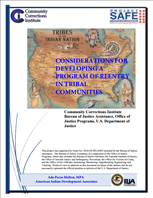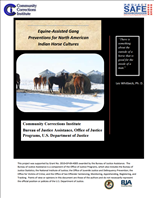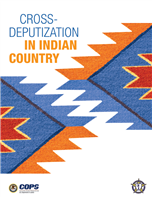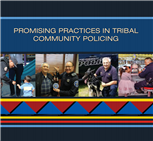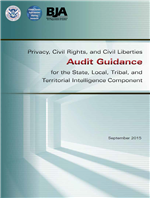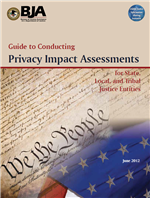Considerations for Developing a Program of Reentry in Tribal Communities
Nationally, reentry is a growing concern shared by tribal governments. Tribal governments are becoming more proactive as they look for options and ways to meet the reentry and reintegration needs and concerns of American Indian and Alaska Natives (AI/AN) ex-offenders or re-entrants and the tribal communities they may return to upon release.
High Intensity Drug Trafficking Areas (HIDTA) Program
Created by Congress in 1988, the High Intensity Drug Trafficking Areas (HIDTA) Program coordinates and assists Federal, State, Local, and Tribal law enforcement agencies (LEAs) to address regional drug threats with the purpose of reducing drug trafficking and drug production in the United States.
Equine-Assisted Gang Preventions for North American Indian Horse Cultures
This document discusses how equine-assisted programs can serve as gang diversion programs and outlines how to set up programs.
Law Enforcement Intelligence: A Guide for State, Local, and Tribal Law Enforcement Agencies
Law Enforcement Intelligence: A Guide for State, Local, and Tribal Law Enforcement Agencies is a policy oriented review of current initiatives, national standards, and best practices. This Guide is intended to support policy in law enforcement agencies and seeks to objectively provide the best knowledge and practice of law enforcement intelligence at the time of publication. It is not meant as an academic work nor does it look at theoretical issues or arguments. It is not directed as a guide to the intelligence community except to explain the roles, responsibilities, and restrictions of the intelligence community's state, local, and tribal law enforcement partners.
Tribal Oriented Policing Strategies (TOPS) – Online Training
This is an online training consisting of portions of the classroom TOPS training. Four comprehensive online modules cover topics including: positive ethics, communication, leadership styles, identifying key stakeholders, partnership building, a six-step problem-solving model, and examples of success are covered.
Tribal Oriented Policing Strategies (TOPS) – Classroom Training
This course explores strategies to enhance collaboration between law enforcement agencies and the community to reduce crime and improve community quality of life. Practice working in organized problem-solving teams through interactive exercises to develop an action plan using community policing principles to address specific public safety threats in your community.
Public Law 280 Training Program - Online
Online training course around Public Law 280 and what it means for tribal and non-tribal law enforcement. Modules will include - What is PL 280, Collaborative Efforts in Indian Country Policing, Sovereignty through Effective Law Enforcement, and Community Policing Strategies to Enhance Responsiveness in PL280 States.
A Circle of Healing for Native Children Endangered by Drugs
This seven-video series weaves Native stories and cultural practices from across the Nation to show many of the ways children, families, and communities are healing from drug endangerment. This resource is intended to generate conversation and inspire communities to come together to develop, enhance, and share their own responses to these issues. There is no single tribal model or best practice for addressing the effects of alcohol- and drug-related violence and victimization. Each community must determine the culturally relevant responses that are best for helping their victims heal.
A Healing Journey for Alaska Natives
This five-video series, produced by OVC and the Office on Violence Against Women, is designed to educate federal, state, local, and tribal victim service providers, criminal justice professionals, and others who work on issues related to domestic violence, sexual assault, and human trafficking experienced by Alaska Natives.
Alcohol-Facilitated Sexual Assault in Indian Country
OVC and the Office on Violence Against Women collaborated to produce this four-video series, designed for criminal justice personnel, victim advocates, and allied professionals who work with victims of sexual assault in Indian Country. The videos increase awareness about the prevalence of alcohol used as a vehicle to facilitate sexual violence perpetration and the targeting of vulnerable victims, to include intoxicated persons, by sex offenders; provide commentary on enhancing the investigation and prosecution of sexual violence crimes; and present case studies that illustrate best practices for responding to victims of alcohol-facilitated sexual assault and underscore the need for collaboration and a coordinated multijurisdictional response.
Enhancing Law Enforcement Response to Victims
With funding from and in collaboration with the Office for Victims of Crime (OVC), the International Association of Chiefs of Police (IACP) has designed a national strategy that guides policies, procedures, and training in state, local, and tribal law enforcement agencies to substantially enhance the culture and practice of serving crime victims. This DVD presents the benefits, challenges, methods, and responsibilities for placing a high priority on crime victims’ interests and meeting their needs, and for enhancing law enforcement agencies’ response to victims of crime across the Nation.
Cross-Deputization in Indian Country
This report - based on the work of the National Sheriffs' Association, which assembled a cross-deputization advisory panel - examines the jurisdictional and legal limits of cross-deputization and how it has been implemented in various law enforcement agencies in Indian country. It also describes some of the most promising practices and provides sample documents and agreements.
Promising Practices in Tribal Community Policing
From 2013 to 2015, the International Association of Chiefs of Police (IACP) partnered with the U.S. Department of Justice Office of Community Oriented Policing Services (COPS Office) to research the most promising community policing practices in Indian country. This guidebook identifies effective strategies, programs, and services designed by tribal law enforcement around the United States. It is intended to help tribal police departments and their partners improve or create programs and build trust with tribal members. The publication also seeks to educate non-tribal law enforcement about policing in Indian country to prepare them to partner with tribal colleagues.
Privacy, Civil Rights, and Civil Liberties Audit Guidance for the State, Local, Tribal, and Territorial Intelligence Component
In order to safeguard the nation while respecting individuals’ privacy, civil rights, and civil liberties (P/CRCL), the U.S. Department of Justice’s Bureau of Justice Assistance—with support from the Global Justice Information Sharing Initiative’s Criminal Intelligence Coordinating Council (CICC) and in partnership with the U.S. Department of Homeland Security (DHS) Office of Intelligence and Analysis (I&A), the DHS Office for Civil Rights and Civil Liberties (CRCL), the DHS Privacy Office (PRIV), and the Nationwide Suspicious Activity Reporting (SAR) Initiative (NSI)—developed this Privacy, Civil Rights, and Civil Liberties Audit Guidance for the State, Local, Tribal, and Territorial Intelligence Component.
Guide to Conducting Privacy Impact Assessments for State, Local, and Tribal Justice Entities
This Guide to Conducting Privacy Impact Assessments for State, Local, and Tribal Justice Entities (or “PIA Guide”) allows practitioners at state, local, and tribal (SLT) justice entities to examine the privacy implications of their information systems and information sharing collaborations so they can design and implement policies to address vulnerabilities identified through the assessment process.
Comprehensive Opioid, Stimulant, and Substance Abuse Program
BJA’s Comprehensive Opioid , Stimulant, and Substance Abuse Program (COSSAP) (formerly COAP) provides support for effective local, state, and tribal responses to illicit substance use and misuse in order to reduce overdose deaths, promote public safety, and support access to treatment and recovery services in the criminal justice system.
Public Safety Partnerships in Indian Country
The COPS Office awarded the National Criminal Justice Training Center (NCJTC) of Fox Valley Technical College a cooperative agreement in FY 2010 to provide training and on-site assistance to support the Mendocino County Sheriff's Office and the Round Valley Indian Tribes and other community stakeholders to improve communication and collaboration between jurisdictions. Public Safety Partnerships in Indian Country describes the experiences of the Mendocino County Sheriff's Office and Round Valley Indian Tribes in developing partnerships to address public safety issues. Their contributions provide a comprehensive resource for other tribes wishing to implement collaborative programs across jurisdictions to improve public safety in their communities.
Tackling the Opioid Epidemic in Rural Communities
On December 13–14, 2018, the Bureau of Justice Assistance (BJA) and the U.S. Department of Agriculture (USDA) partnered to convene judicial and law enforcement leaders from select rural communities to discuss special challenges associated with tackling the opioid epidemic, to share information on programs and innovations, and to promote discussion and peer learning. BJA and USDA are pleased to release this video of interviews from that event.
Conversations with Rural Law Enforcement Leaders: Volume 1
Rural law enforcement agencies face increasing rates of crime and disorder—and often have dwindling resources with which to combat them. To discuss critical issues in rural policing, the Office of Community Oriented Policing Services (COPS Office) and the Bureau of Justice Assistance (BJA) convened five listening sessions with rural law enforcement stakeholders in September 2019 to discuss rural law enforcement's common concerns, challenges, and needs. The results of these sessions are summarized here.
The Tribal Youth Police Academy: Fostering Development of Future Tribal Criminal Justice and Community Leaders
The National Criminal Justice Center of Fox Valley Technical College conducted a Tribal Youth Police Academy in 2014; this publication describes the academy activities and outcomes, including recommendations for replication in other communities.
